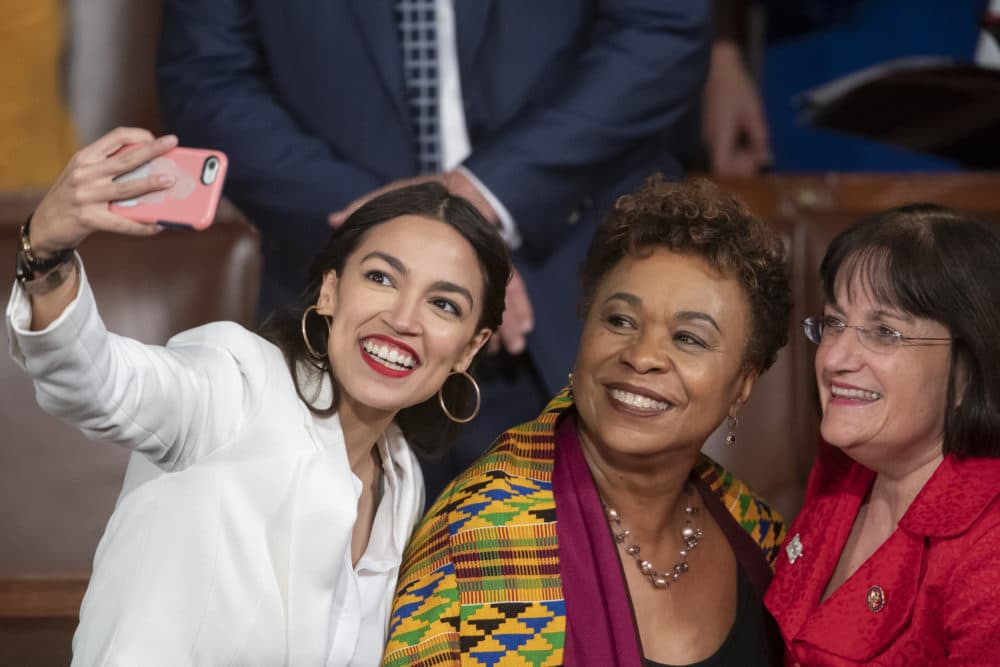Advertisement
Commentary
'Don’t Be Awkward' And Other Advice For Politicians On Instagram

Social media is one of those things that many of us “do” without ever feeling truly comfortable with. Just ask any politician. Digital platforms like Twitter, Facebook and Instagram have presented elected officials with new opportunities to engage with audiences — especially youth audiences — but also, new potential for shooting themselves in the foot.
The first of those scenarios — using social media to connect with young people — has been exemplified by Alexandria Ocasio-Cortez. Her caustic yet empathetic tweets scrutinize issues like inequality and misogyny while upholding justice-oriented solutions. They’re written in a manner that feels blunt and unpolished for a politician. But AOC’s Instagram Live videos take this aesthetic to an entirely different level. Whether she’s eating macaroni and cheese with a coffee stirrer at home or orienting herself to the halls of Congress, AOC seems to publish these broadcasts to affirm that she’s still one of us — ”us” being ordinary young people who don’t have the money or social capital that most politicians possess.
Given that AOC was working at a bar less than a year ago — with less than $7,000 in her savings account — raw “everyman” videos work beautifully for her. But that hasn’t stopped more traditional politicians from jumping on the bandwagon.
No doubt prodded by consultants who fail to see the context behind engagement metrics, some of the rumored Democratic contenders for the presidency are getting in on the action. Last week, we got to watch Elizabeth Warren drink a beer in her kitchen after a long day. This week, Beto O’Rourke gave us a front row seat to his dental cleaning, during which he talked about the tribulations of immigrants — such as the mother of the dental hygienist who was polishing his molars. If this continues, it won’t be long before Joe Biden is offering a lecture on unilateral trade agreements while unclogging his toilet.
Naturally, the Internet laughed over Warren and O’Rourke’s “Ordinary Person” broadcasts. And it’s not hard to understand why. Warren and O’Rourke are not ordinary people. They’re both relatively wealthy, they’ve been in public office for some time, and they’re flirting with the ideas of jumping into the most grotesquely expensive and grueling race in American politics. We perceive them as Major League Politicians, and this deprives them of the ability to imbue the mundane indignities of everyday life with any kind of authenticity.
On a human level, you can’t help but feel for politicians who engage in these misguided attempts to connect with young people. Digital media and its algorithmic enigmas are a tough nut to crack even for Millennials and Gen Z’ers who’ve grown up with connective technology. But watching competent politicians misuse social media like this dredges up bad memories of how the Democrats bungled their digital approach in the 2016 election.
It’s worth recalling how Hillary Clinton and her campaign team mistook digital presence for engagement. Cracking jokes about Snapchat and inviting young voters to express their thoughts on student debt in “3 Emojis or less” didn’t channel the overwhelming Millennial votes that Clinton needed.
In the end, the 2016 Millennial vote was depressed. What this signaled, in part, was the Democratic Party elite's failure to grasp how social media engagement had changed since the more nascent years when Facebook and Twitter were less omnipresent and simply being "on" either platform was enough to help a politician reach youth voters. Just ask Barack Obama, who got on board with Facebook and Twitter well before most of his cohorts did.
Today, the key to social media isn't just being there — it's creating and sharing content that feels bracingly genuine. And here’s the thing: the really important word there is “feels.”
Today, the key to social media isn't just being there -- it's creating and sharing content that feels bracingly genuine.
The irony of digital authenticity is that it’s largely informed by our preconceptions of people who are striving to appear genuine. For incoming politicians from humble backgrounds, such as AOC, "authenticity" can mean talking about racial and wealth inequality in settings that are as humble as the kitchen sink. But the rules for Major League Politicians are different. The "Look At Me Doing Ordinary Stuff!" strategy doesn't work for someone who already belongs to the political establishment because we know that they're stooping down to our level of being. We see them implying that their lives aren’t really all that different from ours, and we know that’s not true.
If videos like the ones that Warren and O’Rourke published spark an Instagram Live arms race among the 2020 Democrats, we’re in trouble. But the good news is that the primary hasn’t fully flared up yet and there’s still time to nip misguided ideas in the bud.
So here’s my plea to every politician who’s planning to run for president: stick to what’s routine for you. If we’ve never seen you give a speech in a garage, don’t try it now. If you’ve never opened a Rolling Rock on camera, save it until after the election. Talk candidly about the issues that matter to you, don’t worry about how “relatable” your background and props are, and accept that you live in a rarified world that most young people can’t even imagine.
That’s the way it is, and it shouldn’t be a dealbreaker. But pantomiming an unremarkable existence could be.
v

